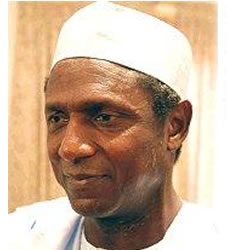


Posted by By JACOB EDI, Abuja on



Twenty-four hours after the Federal Government released the names of members of an electoral reform panel to reviews the country's electoral process, the European Union Election Observation Mission (EUEOM) says the 2007 elections lacked transparency, credibility and was fraudulent.
Twenty-four hours after the Federal Government released the names of members of an electoral reform panel to reviews the country's electoral process, the European Union Election Observation Mission (EUEOM) says the 2007 elections lacked transparency, credibility and was fraudulent.
Releasing its final report on the election in Abuja on Thursday, EUEOM said the 2007 elections were marred by poor organisation, lacked essential, widespread procedural irregularities and witnessed widespread voter disenfranchisement.
According to Max van den Berg, chief observer of the EUEOM and member of the European parliament, "our report contains two clear messages. First the 2007 process was not credible and in view of the lack of transparency and evidence of fraud, there can be no confidence in the results. Second, that urgent and comprehensive reform is required to improve the framework and conduct of future elections."
He said that there was substantial evidence of fraud in the election, adding that there was lack of equal conditions for political parties as well as candidates.
The situation, the election team noted, was compounded by the fact that the election was held under an improved atmosphere where freedom of expression and assembly were respected during the campaigns, adding that the judiciary played a generally positive and independent role and the people showed a remarkable commitment to democracy.
The report said it was essential that "the Nigerian authorities immediately begin to take steps to improve the electoral framework and demonstrate sufficient political will to ensure that the next presidential and parliamentary elections are held in full compliance with international and regional standards."
Although the report stopped short of calling for the cancellation of the results, Max said it is not for them to decide for the Nigerian people what to do with the report.
"All we are concerned about is the future of democracy in this country. It is for the Nigerian people to decide for themselves, but we have made our conclusions," he said.
Contrary to the position of chairman of the Independent National Electoral Commission (INEC), Prof. Maurice Iwu, that the EU observers were not invited, Max emphasized that apart from the fact that they complied with international standards for democratic elections and operated in accordance with the declaration of the principles for international election observation, INEC actually invited them.
"Those criticizing us should know that it is all about Nigeria. The Nigerian people. It would have been better, if they took corrections rather than say what's your business". At the end of the day, it will all be about the Nigerian people," he said.
Max hinted that following their report, the EU parliament would meet to discuss the outcome of the report and decide whether or not to continue to relate with "the Nigerian officials or the people."
He disclosed that even after the 2003 elections there was a debate on whether EU countries would continue to relate with the Nigerian authorities or not "but I was at the EU parliament and I argued in favour of Nigeria because we had hopes, but this time we feel extremely disappointed."
The 99-page report contain specific recommendations, which include, the implementation of a clear and effective guideline for voting, counting, collation and publication of results, establishment of an effective guideline to ensure compliance with election law, improvement of the procedure for candidate registration, improvement of the voter register as well as strengthening the equitable role of the media among others.
Meanwhile, the INEC says the EUEOM report was not only aggressive but designed to incite Nigerians and therefore cause crisis in the country.
The commission also said it will come out with its own version of what transpired during the elections for Nigerians to see.
Philip Umeadi Jnr, INEC's national commission in charge of information, stated that the commission had reservations about the language of the EU EOM team and the timing, especially at a time the election tribunals are sitting.
"Looking at the whole thing, there is a clear evidence that the report is intended to incite the people, that is our impression about the whole thing, and that is certainly not in tandem with the principles of international election observation and monitoring," Umeadi told reporters.
He also insisted that the election monitors violated international code of conduct concerning monitoring of elections, just as the INEC chairman said on Wednesday when the EU team paid him a courtesy call.
"We are looking at the principles of the application of those articles.
So while Nigeria clearly subscribes to all the articles concerning the election monitoring, which is like code of conduct for international election observation, it must be noted that democracy is a process and not a destination, for that, it requires functioning institutions, so it is not only about INEC and if you consider the political atmosphere prevalent at the time that the elections were conducted, you will agree with me that, in the application of those internationally acceptable articles on election observation we did fairly well, no doubt about that," Umeadi argued.
He however said that it was not as if there were no problems with the election, adding, "we are simply disagreeing with the EU mission's report not that we are taking offence. But we take strong exceptions to the use of language."
Umeadi said there was no rift between the commission and EU. He however, refused to confirm or deny whether the commission would still invite EU in future elections.
"Our concern now is the sovereignty of the nation and not just about INEC," Umeadi stated.

